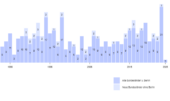The highest international court has found Israel to be in violation of the UN Convention on Racial Discrimination and Apartheid. The German organisation RIAS and the Berlin Register do not draw any conclusions from this.
In an unprecedented opinion on Friday, the United Nations International Court of Justice (ICJ) ruled that Israel’s settlement policy in Palestine is a violation of international law. By a large majority, the judges see Israel’s practices as a breach of the UN Anti-Racism Convention, which prohibits racial segregation and apartheid. Other UN member states should therefore not politically support the occupation. States could therefore be obliged to criticise Israel for apartheid and end trade relations and other cooperation in the West Bank, East Jerusalem and Gaza.
Until now, the German government’s line has been to categorise even the accusation of apartheid against Israel as an “anti-Semitic narrative”. This is how the German government’s anti-Semitism commissioner, Felix Klein, explained it four years ago in a debate about the historian Achille Mbembe. In Germany, the call for a boycott of goods or services from the occupied territories is also considered unacceptable and anti-Semitic.
Such statements are not punishable by law, but for some years now they have been classified by monitoring centres as “offensive behaviour” directed against Israel. They regularly appear as “incidents” in chronicles compiled by the federal organisation RIAS and the Berlin Registers operating in many districts. Both organisations are financed by federal and state funds.
Even after the ICJ’s report, the monitoring centres will continue to pursue statements on apartheid, they confirmed on Tuesday. “RIAS reporting offices document the accusation of apartheid as an anti-Semitic incident if it demonises the state of Israel as a whole and thus delegitimises it as a racist endeavour,” a spokesperson told “nd”. Equating the conditions in Israel with those in South Africa during apartheid in the second half of the 20th century “strengthens anti-Semitic narratives of the ‘deceitful’ or ‘malicious’ Jew”, according to another statement by the Berlin Register.
However, it is unclear when an accusation of apartheid is categorised as anti-Semitic – and when it is not. According to RIAS, this is done after a “further categorisation of the context”, with the spokesperson citing “the denial of Israel’s right to exist” as an example.
RIAS does not keep a chronicle of incidents of “hurtful behaviour” classified as anti-Semitic on its website, so it is difficult to trace or quantify them in terms of context. However, the Berlin Register does keep such a chronicle, which can also be searched by keyword. Since 7 October, there have been 50 anti-Semitism reports on cases in which Israel was accused of apartheid.
Many of these entries originate from RIAS, others are taken over after a “citizen notification” or are based on Internet findings by the offices of the monitoring centres. In most cases, there is no context, such as the report taken from RIAS “In a café in Neukölln, the graffiti ‘Free Palestine! End Israeli Apartheid!’ was discovered”.
Almost half of the incidents with an apartheid reference (24 in total) that have been classified as antisemitic by the Berlin reporting centres since 7 October concern stickers with the inscription “No Pride in Israeli Apartheid”. This alludes to Pride parades such as Christopher Street Day, which also regularly take place in Israel. The most recent such discovery was reported today (Wednesday) in Wedding: “An Israel-related, anti-Semitic sticker with the inscription ‘No Pride in Israeli Apartheid’ was discovered and removed in Brüsseler Straße”.
On their website, the Berlin Registers explain that the stickers fulfil “double standards”. When asked, a spokeswoman for the Berlin Register pointed to the imbalance in left-wing criticism of Israel. “We are aware that human and civil rights should also be demanded from Israel, but then this should apply equally to Israel’s neighbouring countries, which are not the focus of the international left.” This is why the apartheid accusation continues to be regarded by the Berlin registers as “demonisation of the Jewish state of Israel”.
“Of course there is anti-Semitism among Palestinians and also in the solidarity movement against the Gaza war,” says sociologist Peter Ullrich on the practice of the monitoring centres. However, they look at the Middle East conflict with “anti-Semitism glasses”. “We need spaces where we can talk about the massive human rights violations in Israel and Palestine, including apartheid and genocide,” demands the anti-Semitism researcher. He criticises the practice of reporting offices as a ” distraction manoeuvre”.
Published in German in „nd“.
Image: The statement (here at the CSD) is considered “demonisation of Israel” and therefore anti-Semitism by monitoring centres in Germany (Hossam el-Hamalawy/ Flickr, CC-BY-2.0).





Leave a Reply